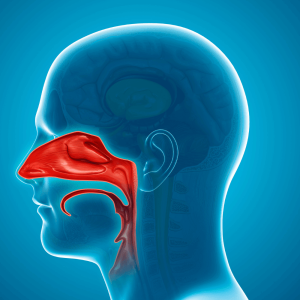Understanding Nasal Congestion
What is Nasal Congestion?
The Anatomy of the Nasal Passage

The nasal passages are lined with a thin layer of tissue called the nasal mucosa. This mucosa produces mucus, which helps to trap and remove particles such as dust, allergens, and bacteria. When the nasal mucosa becomes irritated or inflamed, it can lead to nasal congestion.
Let’s dive deeper into the anatomy of the nasal passage. The nasal cavity is divided into two sides by a thin wall called the nasal septum. This septum is made up of cartilage and bone, and it provides structural support to the nose. However, sometimes the nasal septum can be deviated or crooked, leading to a condition called a deviated septum. A deviated septum can contribute to nasal congestion by blocking the airflow through one or both nostrils.
Within the nasal cavity, there are three turbinates on each side. These turbinates are bony structures covered with a layer of tissue called the nasal conchae. The turbinates help to humidify and filter the air as it passes through the nose. However, when the turbinates become swollen due to allergies, infections, or other factors, they can obstruct the nasal passages and cause congestion.
In addition to the nasal mucosa, the nasal passages are also lined with tiny hair-like structures called cilia. The cilia move in coordinated waves, sweeping mucus and trapped particles towards the back of the throat, where they are swallowed or expelled. However, when the nasal passages are congested, the cilia may not function properly, leading to mucus buildup and further exacerbating the congestion.
Various factors can contribute to nasal congestion. Allergies, such as hay fever or allergic rhinitis, can cause the nasal passages to become inflamed and congested in response to exposure to allergens such as pollen, dust mites, or pet dander. Infections, such as the common cold or sinusitis, can also lead to nasal congestion as the body’s immune response causes inflammation in the nasal passages.
Other factors contributing to nasal congestion include environmental irritants, such as cigarette smoke or strong odors, which can irritate the nasal mucosa and trigger congestion. Hormonal changes, such as those that occur during pregnancy or menstruation, can also affect the nasal passages and lead to congestion. Additionally, if used for prolonged periods, certain medications, such as nasal decongestant sprays, can cause rebound congestion when stopped.
It is important to address nasal congestion, as it can affect the quality of life by interfering with sleep, causing headaches, and impacting the ability to concentrate. Treatment options for nasal congestion depend on the underlying cause and may include over-the-counter nasal sprays, antihistamines, decongestants, or prescription medications. In some cases, surgical intervention may be necessary to correct structural abnormalities, such as a deviated septum.
In conclusion, nasal congestion is a common condition that various factors, including inflammation of the nasal mucosa, structural abnormalities, allergies, infections, and environmental irritants can cause. Understanding the nasal passage’s anatomy and the factors contributing to congestion can help individuals manage and alleviate this bothersome symptom.
Common Causes of Nasal Congestion
Various factors can contribute to nasal congestion, including allergies, infections, and structural problems. Understanding the underlying cause of your nasal congestion can help guide treatment options.
Nasal congestion is a common condition that affects many people. It can be quite bothersome, making it difficult to breathe through the nose and causing discomfort. While it is often a symptom of a cold or allergies, other potential causes should be considered.
Allergies and Nasal Congestion
Allergies like hay fever or pet allergies can trigger nasal congestion. When the body comes into contact with an allergen, such as pollen or pet dander, it releases chemicals that cause the nasal passages to swell and produce excess mucus.
Allergies are a common cause of nasal congestion, especially during certain times of the year when allergens like pollen are more prevalent. The body’s immune system reacts to these allergens, causing inflammation in the nasal passages and leading to congestion. It is important to identify the specific allergen causing the reaction in order to manage the symptoms effectively.
Infections and Your Nasal Health
Nasal congestion can also result from a viral or bacterial infection, such as the common cold or sinusitis. These infections cause inflammation in the nasal passages and can lead to nasal congestion and other symptoms like a sore throat and cough.
When a viral or bacterial infection enters the body, it can affect the respiratory system, including the nasal passages. The body’s immune response to the infection causes the nasal passages to become inflamed and produce excess mucus, resulting in congestion. Treating the underlying infection is crucial in relieving nasal congestion caused by infections.
Structural Problems and Nasal Congestion
In some cases, nasal congestion may be caused by structural abnormalities, such as a deviated septum or nasal polyps. These conditions can obstruct the nasal passages and interfere with proper airflow, resulting in chronic nasal congestion.
A deviated septum occurs when the thin wall between the nostrils is displaced, causing one nasal passage to be smaller than the other. This can lead to difficulty breathing through the nose and chronic congestion. Nasal polyps, on the other hand, are noncancerous growths that develop in the lining of the nasal passages. They can block the nasal passages and cause persistent congestion.
It is important to consult with a healthcare professional if you suspect that structural abnormalities are causing your nasal congestion. They can provide a proper diagnosis and recommend appropriate treatment options, including medication or surgery.
Symptoms Associated with Nasal Congestion
Nasal congestion can present with various symptoms that vary in severity from person to person. Recognizing these symptoms is crucial for determining when to seek medical attention and initiating appropriate treatment.
When experiencing nasal congestion, paying attention to the various signs and symptoms that may accompany this condition is important. While the primary symptom is difficulty breathing through the nose, other common symptoms can provide valuable insight into the severity and impact of nasal congestion on an individual’s daily life.
A stuffy or runny nose is one of the most common symptoms associated with nasal congestion. This can be incredibly frustrating, as it often leads to constant nose blowing and the need for tissues at hand. The constant presence of nasal discharge can also cause discomfort and irritation around the nostrils, leading to redness and soreness.
In addition to a stuffy or runny nose, individuals with nasal congestion may also experience facial pressure or pain. This can manifest as a feeling of heaviness or tightness in the sinuses, which are the air-filled cavities located behind the forehead, cheeks, and eyes. The pressure can be particularly bothersome, affecting one’s ability to concentrate and perform daily tasks.
Another symptom that often accompanies nasal congestion is a reduced sense of smell. When the nasal passages are congested, detecting and differentiating various scents becomes compromised. This can impact one’s enjoyment of food, as taste is closely linked to the sense of smell.
Additionally, a reduced sense of smell can affect one’s safety, as the ability to detect potentially dangerous odors, such as gas leaks or smoke, is diminished.
Furthermore, nasal congestion can contribute to snoring during sleep. The blockage in the nasal passages can cause air to flow more forcefully through the mouth, leading to the vibration of tissues in the throat and resulting in the characteristic sound of snoring. This disrupts sleep quality for the individual with nasal congestion and can also disturb their sleeping partner.
When to Seek Medical Attention
While nasal congestion is often a self-limiting condition, there are instances where medical intervention may be necessary. It’s important to be aware of the circumstances that warrant seeking medical attention to ensure proper evaluation and treatment.
If nasal congestion persists for more than a week, it is advisable to consult a healthcare professional. Prolonged congestion may indicate an underlying issue that requires further investigation and treatment. Additionally, medical attention should be sought promptly if nasal congestion is accompanied by severe pain or a high fever. These symptoms could indicate a more serious infection or inflammation requiring medical intervention.
Furthermore, if nasal congestion significantly affects your quality of life, it is important to seek medical advice. This includes situations where the congestion interferes with your ability to sleep, work, or engage in daily activities. A healthcare professional can provide guidance on appropriate treatment options to alleviate symptoms and improve your overall well-being.
In conclusion, recognizing the symptoms associated with nasal congestion is essential for understanding its impact on an individual’s daily life. By being aware of the various signs and symptoms, individuals can make informed decisions about when to seek medical attention and initiate appropriate treatment.
Treatment Options for Nasal Congestion
Over-the-Counter Remedies
Prescription Medications for Nasal Congestion
Natural Remedies and Lifestyle Changes
Preventing Nasal Congestion
Tips for Allergy Management
Maintaining Nasal Health
When to Consult a Specialist
If nasal congestion persists despite trying various remedies and lifestyle changes, consulting with an otolaryngologist or ear, nose, and throat specialist may be beneficial. They can evaluate your condition, perform necessary diagnostic tests, and recommend appropriate treatment options.
In conclusion, nasal congestion can greatly impact one’s daily life and overall well-being. By understanding the causes and treatment options for nasal congestion, individuals can find relief and regain control over their nasal health. Whether through over-the-counter remedies, prescription medications, natural remedies, or preventive measures, taking proactive steps toward managing and preventing nasal congestion can lead to a better quality of life.


